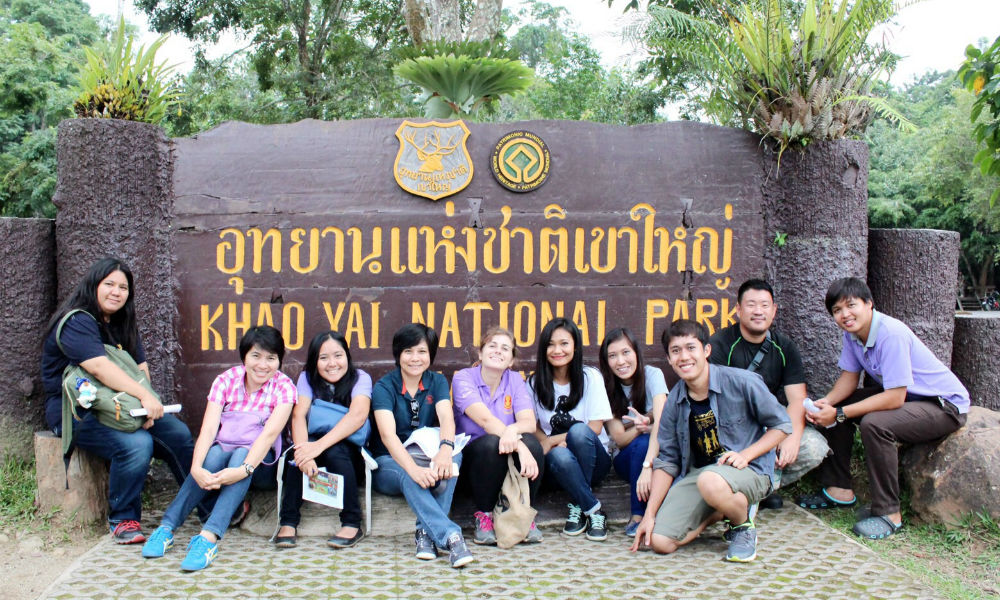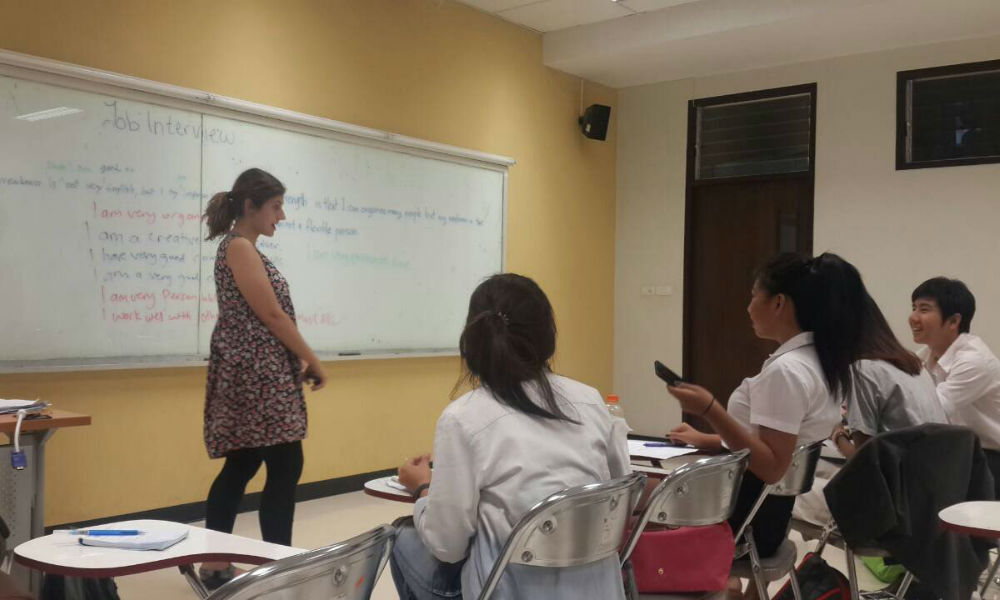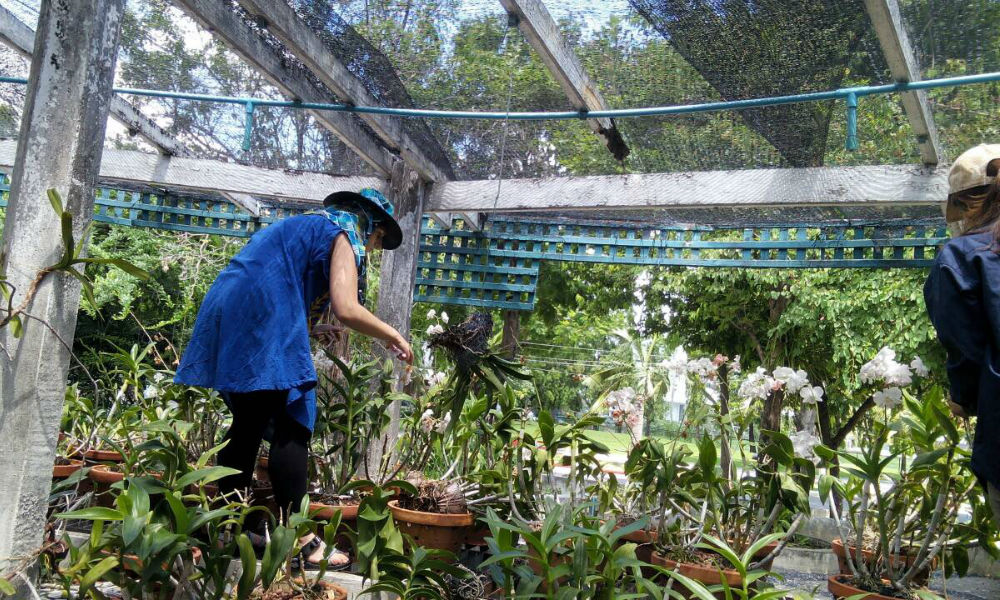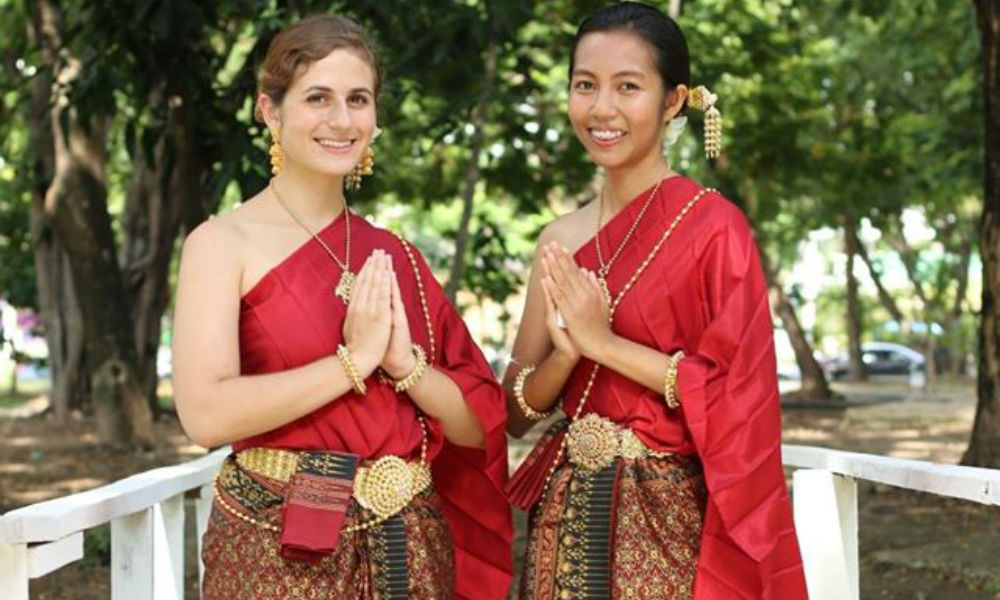Finding her future in Thailand
Geography
SUMMARY: 2016 Geographic Science alumnus, Olivia Meyer, reflects on her transformative study abroad experience in Thailand.
By: Brett Seekford
“My courses in Geography were unquestionably the most pivotal in leading to the internship in Thailand,” explained Olivia Meyer, a 2016 alumnus of JMU’s Geographic Science program. Meyer spent the most recent summer as a member of a research team in Thailand after developing an interest in the region through her undergraduate courses. With the assistance of faculty mentors, she learned about a research project taking place in partnership with Kasetsart University (KU) in Thailand. Before she knew it, she was traveling abroad to begin what would prove a transformative experience.
Already harboring a passion for Southeast Asia, her specific focus while in Thailand opened her up to the study of climate change as she surveyed the effects of global warming on the country’s susceptible climate and vegetation. As a part of KU’s Physiology of Ornamental Plants (P.O.P.) Laboratory research team, she visited different sections of Thailand to conduct her studies. Meyer also worked as an English instructor for Thai students, honing her leadership skills and gaining a greater appreciation for cultural differences. An added benefit of this work was that it helped her establish a longing for a continued pursuit of knowledge geared toward promoting a global consciousness.

Meyer teaching English to Thai students at Kasetsart University.
Meyer recently agreed to share her insights from her time abroad. Below is a transcript of the interview, edited for length and clarity.
---
Brett Seekford: How did your time at JMU, specifically your work in the ISAT Geographic Science concentration, lead to your research in Thailand? What faculty, classes, and experiences were particularly influential?
Olivia Meyer: Prior to JMU, I don’t recall ever before having my attention drawn to the region of Southeast Asia. My collegiate Geography courses, especially with Professors Mace Bentley and Manita Khemthong, were valuable in terms of not only bringing this and other previously vaguely understood parts of the world into focus but of developing a profound appreciation of them. If we did a case study or studied a concept that occurs in an area, we learned about that place holistically, considering the culture, demography, environment, politics, etc.
BS: How did you find out about the opportunity to partner with Kasetsart University for plant research? Why did you choose to pursue this route after graduating?
OM: Inspired by my courses, at this point I was eagerly seeking a way to look at the world from a non-Western perspective. I wandered into Professor Khemthong’s office one day without any expectations other than to discuss my future, but ended up leaving with a slew of exciting new and more concrete possibilities. Following several informal meetings and interviews, Professor Khemthong was instrumental in setting up an internship for me with her contacts at Kasetsart University.
Once this once-in-a-lifetime opportunity presented itself, I had to take it. This opportunity was totally unlike anything I had experienced before, since I would be the only American in the laboratory of this university, located in a country that is dramatically different from the Western world. My interests are highly focused on the interaction of human and environmental systems, so it was invaluable to learn about sustainability, climate change, and horticulture from the perspective of Thai faculty and students. This was a chance to take advantage of this time after graduation to experience something completely different from my normal environment before jumping into a life of relative stability and absolutes.
BS: Describe your time in Thailand. What were some memorable experiences? What did your research entail?
OM: Several events shaped some of my major takeaways. For instance, during the first month I spent in Bangkok, I was introduced to the Physiology of Ornamental Plants Laboratory (P.O.P.) lab’s various operations, which included hands-on tissue culture lab work, greenhouse maintenance, and support of students’ independent graduate-level research. As part of this work, I travelled with a few members of my lab to other areas of Thailand in July. This included a trip to the Doi Pui Research station in the north of Thailand. I was able to remain in Chiang Mai for several days and observe firsthand the extreme variation in climate and vegetation of this country. During this expedition, I was invited to assist in manual farm labor such as sorting grapes, which brought back memories of my time volunteering on organic farms with WWOOF and Workaway. It was useful to see alternative methods and practices of tissue culture to create strains and eye-opening to discover how farmers were being personally affected by such government-mandated efforts as the Royal Project, which was developed for the purpose of reversing such trends as deforestation, poverty, and opium production.

Meyer working with orchids outside of Kasetsart University's laboratory.
My third and final month was spent almost exclusively teaching English on a daily basis. This was my favorite aspect of the internship, as it allowed me to work both independently to prepare lessons and in collaboration with these kind, unassuming, and appreciative students. By this point, I had learned from experience that many Thai people are shy about speaking in a foreign language and are fearful of making grammatical errors. This understanding, however, led me to come up with unthreatening lessons that would making learning fun and got them out of their seats and speaking instead of taking tests. My grasp of cultural differences helped me tailor my lesson plans to their needs.
BS: What were some of your major takeaways from your partnership with K.U. and time in Thailand?
OM: Beyond gaining both indispensable personal and professional skills, I was awed by the amount of effort made to ensure that I had a rewarding experience. I never expected to feel so warmly welcomed and looked after by a group of horticulture students who had full plates of their own as students and researchers. By the end of the summer, I had gotten well acquainted with everyone in this small but extremely close-knit lab and, better yet, made what I hope will turn out to be long-lasting friendships.
Now that I am back in the States, I still edit abstracts or applications for my Thai friends, or check in with them about their own opportunities to go abroad. It has been so rewarding to get to know other students who have navigated an entirely different culture yet have similar goals to my own.

Meyer learning about the Thai culture and traditions.
BS: How do you see your work abroad impacting your future?
OM: My experience in Thailand served to reinforce a recently conceived desire to pursue teaching as a career. I also now know I want a job that allows me to travel and learn from different perspectives. The priceless experiences and sensations of living in an unfamiliar environment and getting to know people who have been raised differently is unbelievably enlightening and enriching. For people my age (and those who choose to remain insularly focused) there are so many unknowns in the world—governments that work differently, other religions that predominate and shape worldviews, streets that look chaotic and colorful—that differ from the norms to which we become accustomed. My exact career plans are still being formed, but I know where my priorities lie and I am so grateful for my internship in Thailand for helping me discover that.
